初中英语-词汇串讲1
英语(一)串讲(文字)

英语(一)串讲(文字)英语一串讲第一部分单元重点句型和常考句子Unit One1. 主语+find + it + 形容词+to do sth. Some people who are very intelligent and successful in their fields find it difficult to succeed in language learning. (line2)They find it easy to practice using the language regularly because they want to learn with it. (line 38)2. It is + 形容词+for sb. +to do sth. It is + 形容词比较级+to do sth.+ than + to do sth. It is necessary for them to learn the language in order to communicate with these people and to learn from them. (Line 36)It is more important for them to learn to think in the language than to know the meaning of every word. (Line 32) 3 ….shows / showed that 从句Language learning research shows that successful language learners are similar in many ways. (Line 14)4. Language learning is different from other kinds of learning. (Line 6) 5. Instead of waiting for the teacher to explain, they try to find the patterns and rules for themselves. (Line19-20) 6. On the other hand, if your language learning has been less than successful, you might do well to try some of the technique outlined above.Unit Two1. … spend + (时间、钱等) on sth. 在…上花费时间、钱等… spend + (时间、钱等) in doing sth. 花费时间、钱等做.. They say that it spends too much on useless and impractical programs. (L35)他们说政府在一些没有用处的、不切实际的项目上花钱太多。
第一讲 英语词性大串讲

第一讲英语词性大串讲英语词类分十种:名词、形容词、代词、数词、冠词、动词、副词、介词、连词、感叹词。
1、名词(n.):表示人、事物、地点或抽象概念的名称。
如:boy, morning, bag, ball, class, orange.2、代词(pron.):主要用来代替名词。
如:who, she, you, it .3、形容词(adj.):表示人或事物的性质或特征。
如:good, right, white, orange .4、数词(num.):表示数目或事物的顺序。
如:one, two, three, first, second, third, fourth.5、动词(v.):表示动作或状态。
如:am, is,are,have,see .6、副词(adv.):修饰动词、形容词或其他副词,说明时间、地点、程度等。
如:now, very, here, often, quietly, slowly.7、冠词(art.):用在名词前,帮助说明名词。
如:a, an, the.8、介词(prep.):表示它后面的名词或代词与其他句子成分的关系。
如in, on, from, above, behind.9、连词(conj.):用来连接词、短语或句子。
如and, but, before .10、感叹词(interj..)表示喜、怒、哀、乐等感情。
如:oh, well, hi, hello.一.名词I.名词的种类:以练促记:1. ( 2012天津,32) —Why didn’t Sally play the violin at the concert last night?—She said that her hand hurt, but that was only a(n)_________. I saw her play tennis just now.A. matterB. excuseC. resultD. expression2. (2012重庆,24) —Bill ,what’s your sister’s favorite__________? —She likes volleyball best.A. foodB. colorC. sportD. movie3. ( 2012黑龙江哈尔滨,21 ) Dear friends ,please read every sentence carefully. Details decide __________ or not. If you take it serious-ly, you’ll achieve your goal!A. successB. successfulC. succeed4. ( 2012辽宁沈阳,8 ) The__________in that restaurant looks delicious ,but it tastes bad.A. cookB. tableC. foodD. tool5. (2012江苏南京,3 ) —Could you tell me how to remember new words quickly?—Yes, I think a__________ tree can help you a lot.A. grammarB. equationC. punctuationD. vocabulary6. ( 2012四川成都,33) —Where did you go yesterday, Rick?—I went to see a__________ because I had a cold.A. teacherB. doctorC. reporter7. ( 2012湖北武汉,33)lf by any chance Peter comes to us, please ask him to leave a__________.A. letterB. sentenceC. messageD. notice8. ( 2012浙江温州,5) —Where does your uncle work, Jack?—In a__________ in Paris. He is a policeman.A. TV stationB. bookstoreC. post officeD. police station9. ( 2012江西,27) If you go to visit London, don’t forget your __________ because it rains a lot.A.passportB.moneyC.mapD.umbrella10. ( 2012湖北襄阳,26) —What does your father do ,Lily?—He is __________ . His job is to make sure that drivers obey the traffic rules.A. an actorB. a policemanC. a waiterD. a reporterII. 名词的数:1. 规则名词的复数形式:名词的复数形式,一般在单数形式后面加-s 或-es。
初三英语语法串讲

▲ hero – heroes
tomato – tomatoes
potato – potatoes mosquito--mosquitoes
▲ bamboo – bamboos zoo – zoos radio –radios
photo – photos piano – pianos kilo – kilos
④引导 的状语从句
so that 为了= in order that ⑤结果状语
so that
so ……that such ……that
It was very cold, so that the water in the bowl froze.
He is such a good student that we all like him. ⑥引导让步状语从句
6. 词尾变化 child – children ox -- oxen
7. 单复数同形
fish
deer
Chinese
Portuguese
sheep Japanese Vietnamese
只有复数形式的名词 clothes trousers glasses shorts pants (socks) compasses thanks scissors a pair of trousers a suit of clothes hair / fruit a few white hairs many juicy fruits
lots of much
some (any)
several
a few
a little
few
little
other
the other
others
七年级英语重点知识串讲 (1)

Module 6Around townUnit 1Could you tell me how to get to the National Stadium?Ⅰ.根据句意及首字母提示补全单词1.Don't play football in the s________. It's very dangerous.2.E________ me. Could you tell me the way to the hospital?3.You need a g________ to help you find the place of interest.4.She sometimes t________ the bus to work.5.Go a________ the road, and you will find a supermarket on the left.Ⅱ.根据句意及汉语提示写出单词1.Bill's father works in a ________ (银行).2.Lots of ________ (游客) come to Beijing to visit the Great Wall every year.3.In my home town, there was a big old tree ________ (在……的对面) our school. 4.You must look at the traffic lights before you go________ (越过) the road.5.John is the ________ (第三) student to get to school today.6.There is a science ________ (博物馆) in our city.7.Do you often go to work by ________ (地铁), Lily?8.There are a lot of students in the ________ (书店) at the weekend.9.Walk ________ (沿着) this road and you can find the Forbidden City.10.Please ________ (换方向) left, and then go on walking.Ⅲ.用括号内所给单词的适当形式填空1.—Why not ________(join) an English club to practise your English?—Good idea!2.Could you tell me how ________ (get) to the stadium?3.Go ________(cross) the street and turn left.4.Please turn right at the ________ (three) street.5.She would like ________ (take) a taxi to the National Stadium.Ⅳ.根据本单元对话内容回答下列问题1.Where will the tourist go?________________________________________________________________________ 2.What would the tourist like to buy?________________________________________________________________________ 3.Where else will the tourist go?________________________________________________________________________ 4.Does Lingling know the way to the National Stadium?________________________________________________________________________ 5.How can the tourist get to the National Stadium?________________________________________________________________________Ⅴ.单项选择()1.—________. How can I go to the bank?—You can take the No.17 bus.A.Excuse me B.You're welcomeC.Thanks a lot D.Never mind()2.It's windy today. ________ go out to fly a kite?A.Why don't B.Why not toC.Why not D.Why don't to()3.—How can you________ there?—________ taxi.A.get to; By B.get; ByC.get; In D.get to; In()4.Can you tell me ________ the post office?A.the way B.the way ofC.the way to D.the way in()5.—Excuse me. Which is the way to the hospital?—________A.Sorry, I'm new here.B.It's about five kilometres away.C.Don't ask me.D.Why not take a bus?()6.2017·温州—Mum, I'm going to school now. See you.—________,Mary.A.Here we go B.Wait a momentC.My pleasure D.Have a nice day()7.The school is ________ the right of the bank.A.on B.inC.to D.at()8.Go ________ the street. The hospital is next to the supermarket.A.through B.pastC.cross D.acrossⅥ.根据汉语意思完成句子1.劳驾,请问到博物馆怎么走?Excuse me. Could you tell me ________ ________ ________ to the museum?2.过马路时要小心。
七年级上册英语知识点串讲
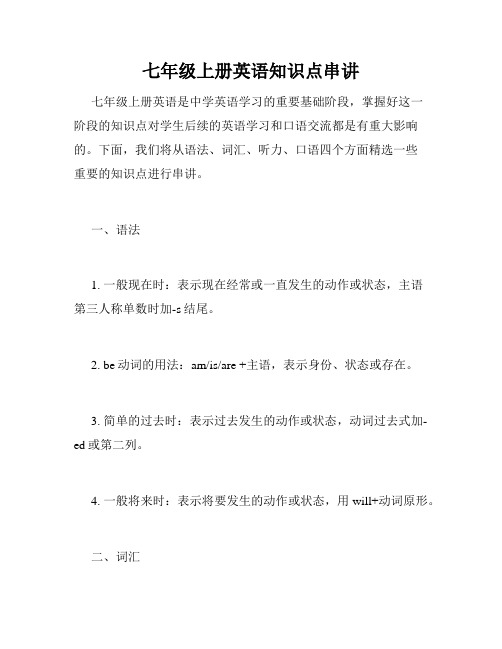
七年级上册英语知识点串讲
七年级上册英语是中学英语学习的重要基础阶段,掌握好这一
阶段的知识点对学生后续的英语学习和口语交流都是有重大影响的。
下面,我们将从语法、词汇、听力、口语四个方面精选一些
重要的知识点进行串讲。
一、语法
1. 一般现在时:表示现在经常或一直发生的动作或状态,主语
第三人称单数时加-s结尾。
2. be动词的用法:am/is/are +主语,表示身份、状态或存在。
3. 简单的过去时:表示过去发生的动作或状态,动词过去式加-ed或第二列。
4. 一般将来时:表示将要发生的动作或状态,用will+动词原形。
二、词汇
1. 数词:用于表示数量的词。
2. 形容词:用于描述人或物的特征的词。
3. 副词:用于修饰动词或形容词的词。
4. 名词:用于表示人、物、地点或事物的词。
三、听力
1. 听力技巧:注重理解含义、注意词义的转化、把握关键信息。
2. 听力材料:短语句、对话、短文等。
3. 听力测试:理解问题、分析选项、选择答案。
四、口语
1. 口语表达技巧:练习口语语感、提高语音语调、注重口语语境。
2. 口语话题:日常交流、购物、旅游等。
3. 口语听说测试:进行日常对话、阅读朗读、情景问答等口语练习。
以上是七年级上册英语较为重要的知识点串讲,学生们应当注意每个知识点的掌握和理解,同时,在学习过程中,应注重练习和听说训练,这样才能真正提高英语水平,提高英语口语交流能力。
初中英语单词串讲课教案

初中英语单词串讲课教案教学目标:1. 学生能够掌握并正确使用本节课所学的单词。
2. 学生能够通过单词串讲的方式,提高词汇运用能力和语言表达能力。
3. 学生能够培养对英语学习的兴趣和积极性。
教学内容:1. 单词串讲:以故事的形式,将本节课所学的单词串联起来。
2. 单词讲解:对每个单词进行详细的解释和例句展示。
3. 练习环节:通过各种练习题,巩固所学单词。
教学步骤:Step 1: 导入(5分钟)1. 教师以生动有趣的故事导入,引起学生的兴趣。
2. 故事中穿插本节课所学的单词,让学生初步接触并记忆。
Step 2: 单词讲解(15分钟)1. 教师逐个讲解本节课所学的单词,包括单词的意思、用法和例句。
2. 讲解过程中,鼓励学生积极参与,提问和回答问题。
Step 3: 单词串讲(15分钟)1. 教师将本节课所学的单词串联起来,以故事的形式呈现。
2. 故事中使用所学的单词,让学生在语境中理解和运用。
Step 4: 练习环节(15分钟)1. 教师提供各种练习题,让学生巩固所学单词。
2. 练习题包括填空题、选择题、翻译题等,形式多样。
Step 5: 总结与作业布置(5分钟)1. 教师对本节课所学内容进行总结,强调重点和难点。
2. 布置作业,要求学生复习本节课所学的单词,并运用到实际情景中。
教学评价:1. 课后收集学生的作业,检查学生对单词的掌握情况。
2. 在下一节课开始时,进行单词默写测试,评估学生对单词的记忆效果。
3. 观察学生在课堂上的参与情况和表现,了解学生的学习兴趣和积极性。
注意事项:1. 单词讲解要清晰易懂,举例生动有趣,帮助学生理解和记忆。
2. 单词串讲要注重语境的设置,让学生能够在实际情景中运用所学单词。
3. 练习环节要设计合理,难度适中,让学生通过练习巩固所学。
4. 鼓励学生积极参与课堂活动,提问和回答问题,提高他们的语言表达能力。
5. 注重教学评价,及时了解学生的学习情况,针对性地进行教学调整。
专题01 重点词汇(短语)归纳(学生版) 2024-2025学年八年级英语上学期期中考点大串讲鲁教版

2024-2025学年八年级上学期期中考点大串讲(鲁教版五四制)专题01 重点词汇(短语)归纳Unit 1 Could you please clean your room?重点词汇(短语)I.核心单词1. 垃圾; 废弃物n. ___________________2. 折叠; 对折v. ___________________3. 地板n. ___________________4. 杂乱; 不整洁n. ___________________5. 也不adv. 两者都不pron. ___________________6. 衬衫n. ___________________7. 给; 递; 走过; 通过v. ___________________8. 借; 借用v. ___________________9. 手指n. ___________________10. 厌恶; 讨厌v. ___________________11. 杂务; 乏味无聊的工作n. ___________________12. 与……同时; 当……的时候; 而; 然而conj. ___________________13. ___________________v. 扫; 打扫→___________________(过去式)14. ___________________v. 扔; 掷→___________________(过去式)15. ___________________v. 借给; 借出→___________________(过去式)16. 点心; 小吃; 快餐n. ___________________17. 精神压力; 心理负担n. ___________________18. 浪费; 垃圾n. 浪费; 滥用v. ___________________19. 提供; 供应v. ___________________20. 而且; 加之adv. ___________________21. 依靠; 信赖v. ___________________22. 发展; 壮大v. ___________________23. 因为; 既然conj. 从……以后; 自……以来prep. , conj. &adv. ___________________24. 邻居n. ___________________25. ___________________n. 独立→___________________adj. 独立的; 自主的26. ___________________adj. 合理的; 公正的→___________________n. 公正性; 合理性→___________________(反义词)adj. 不合理的; 不公正的27. ___________________adj. 有病; 不舒服→___________________n. 疾病28. ___________________v. 落下; 掉下→___________________(过去式)II.重点短语1. 打扫房间___________________2. 倒垃圾___________________3. 洗餐具___________________4. 叠衣服___________________5. 扫地___________________6. 整理床铺___________________7. 没问题___________________8. 在外面待到很晚___________________9. 帮助解决困难___________________10. 至少___________________11. 生……的气___________________12. 扔下___________________13. 走过来___________________14. 频繁, 反复___________________15. 一……就……___________________16. 闲逛___________________17. 目的是; 为了 ___________________18. 依靠; 信赖___________________19. 照顾; 处理___________________20. 结果___________________21. 生病___________________22. 回来___________________用法精萃翻译句子1. ——彼得, 请你倒垃圾好吗?——当然可以, 妈妈。
中考英语考点大串讲(牛津译林版):专题01 Unit 1 Friends【知识清单】
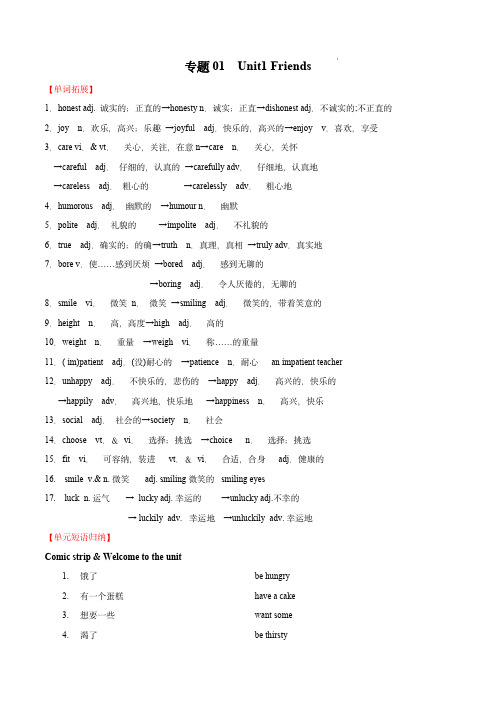
专题01Unit1Friends【单词拓展】1.honest adj.诚实的;正直的→honesty n.诚实;正直→dishonest adj.不诚实的;不正直的2.joy n.欢乐,高兴;乐趣→joyful adj.快乐的,高兴的→enjoy v.喜欢,享受3.care vi.&vt.关心,关注,在意n→care n.关心,关怀→careful adj.仔细的,认真的→carefully adv.仔细地,认真地→careless adj.粗心的→carelessly adv.粗心地4.humorous adj.幽默的→humour n.幽默5.polite adj.礼貌的→impolite adj.不礼貌的6.true adj.确实的;的确→truth n.真理,真相→truly adv.真实地7.bore v.使……感到厌烦→bored adj.感到无聊的→boring adj.令人厌倦的,无聊的8.smile vi.微笑n.微笑→smiling adj.微笑的,带着笑意的9.height n.高,高度→high adj.高的10.weight n.重量→weigh vi.称……的重量11.(im)patient adj.(没)耐心的→patience n.耐心an impatient teacher 12.unhappy adj.不快乐的,悲伤的→happy adj.高兴的,快乐的→happily adv.高兴地,快乐地→happiness n.高兴,快乐13.social adj.社会的→society n.社会14.choose vt.&vi.选择;挑选→choice n.选择;挑选15.fit vi.可容纳,装进vt.&vi.合适,合身adj.健康的16.smile v.&n.微笑adj.smiling微笑的smiling eyes17.luck n.运气→lucky adj.幸运的→unlucky adj.不幸的→luckily adv.幸运地→unluckily adv.幸运地【单元短语归纳】Comic strip&Welcome to the unit1.饿了be hungry2.有一个蛋糕have a cake3.想要一些want some4.渴了be thirsty5.喝一些东西have something to drink6.……怎么样what about7.一些牛奶some milk8.再吃一点食物have some more food9.冰箱里没什么东西了。
初中英语串讲知识点总结

初中英语串讲知识点总结初中英语教学大纲要求学生掌握基础的英语语言知识,并能在日常生活中进行基本的交流。
为了帮助学生更好地复习和巩固所学知识,本文将对初中英语的主要知识点进行总结。
一、词汇与短语1. 基础词汇:学生应掌握与日常生活相关的基础词汇,如颜色、数字、食物、家庭成员、学校科目等。
2. 动词短语:了解并运用常见的动词短语,例如“go shopping”, “play basketball”, “finish homework”等。
3. 介词短语:掌握基本的介词及其短语,如“in the morning”, “on the weekend”, “by the way”等。
4. 形容词与副词:学会使用形容词描述事物,如“big”, “small”, “fast”, “slowly”等,并了解副词的用法。
二、语法知识1. 时态:掌握一般现在时、一般过去时、一般将来时等基本时态的构成和用法。
2. 句型结构:了解肯定句、否定句、疑问句的构造,并能正确使用。
3. 代词:学会使用人称代词、物主代词、反身代词、指示代词等。
4. 冠词:理解不定冠词“a/an”和定冠词“the”的用法。
5. 简单句和并列句:能够构建简单句,并使用并列连词如“and”, “but”, “or”等连接句子。
6. 条件句:理解并使用条件句,特别是真实条件句和虚拟条件句。
7. 被动语态:了解被动语态的基本结构,并能在适当的情况下使用。
三、阅读理解1. 快速阅读:培养学生快速浏览文章,抓住主旨大意的能力。
2. 细节理解:能够准确理解文章中的具体信息和细节。
3. 推理判断:通过文章内容进行逻辑推理,做出合理的判断和推断。
4. 词义猜测:在阅读过程中,能够根据上下文猜测生词的意思。
四、写作技巧1. 句式多样性:在写作中运用不同类型的句子结构,使文章更加丰富和有趣。
2. 段落结构:学会组织段落,包括主题句、支持句和结尾句。
3. 写作类型:掌握不同类型的写作,如记叙文、说明文、议论文等。
初二年级第一次月考考前串讲-英语

大成培训集团仪化校区国庆期间月考冲刺讲座初二年级英语Unit 1 重要知识点1. have something to drink喝点东西→to drink动词不定式作定语have something to eat吃点东西,have a lot of homework to do有许多作业要做【拓展】(1)something 与anything,nothing, everything等其他不定代词一样,作主语时谓语动词要用第三人称单数形式Something is wrong with the computer. 这台电脑出故障了。
(2)形容词修饰不定代词时应放在不定代词之后I have something important to tell you.2. have some more food再有/要些食物【解析】some more+不可数名词或名词复数形式,more是many/much的比较级,意为“再,又”。
some可以更换为基数词,如:two more boys=another two boys【拓展】⑪基数词+more+名词复数=another+基数词+名词复数注意more和another的位置相反。
特殊形式要熟记:one more minute=another minute练一练:还有10个人①ten people ②ten people3. Maybe we can share it.【解析】(1)share 动词,意为“分享;共享”,share sth. with sb. 和某人分享/共用某物(2)【辨析】maybe 与may bemaybe副词,意为“也许,可能,大概”,常位于句首,表示不太肯定的推测,相当于perhaps, probably, possibly.在口语中maybe可单独使用。
Maybe they are in the classroom. 可能他们在教室里。
may be短语,意为“可能地,也许是”,由情态动词may加连系动词be构成,在句中放在主语后构成主系表。
七年级英语下册重点知识串讲 (1)
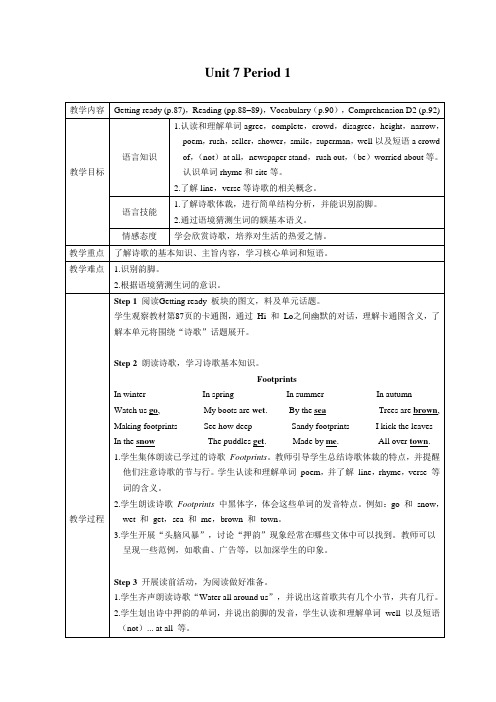
3.学生开展“头脑风暴”,讨论“押韵”现象经常在哪些文体中可以找到。教师可以呈现一些范例,如歌曲、广告等,以加深学生的印象。
Step 3开展读前活动,为阅读做好准备。
Making footprints See how deep Sandy footprints I kick the leaves
In thesnowThe puddlesget. Made byme. All overtown.
1.学生集体朗读已学过的诗歌Footprints。教师引导学生总结诗歌体裁的特点,并提醒他们注意诗歌的节与行。学生认读和理解单词poem,并了解line,rhyme,verse等词的含义。
poem,rush,seller,shower,smile,superman,well以及短语a crowd
of,(not)at all,newspaper stand,rush out,(be)worried about等。
认识单词rhyme和site等。
2.了解line,verse等诗歌的相关概念。
3.学生结合诗歌内容和相关图片回答以下问题。
Where does his dad work?
What does he do at work?
Is he afraid of the height?
What does the writer call his dad?
学生认读和理解单词narrow,superman以及短语(be)worried about。
Unit 7 Period 1
教学内容
【最新推荐】201X中考英语高频词汇串讲第一讲a (an)-优秀word范文 (1页)
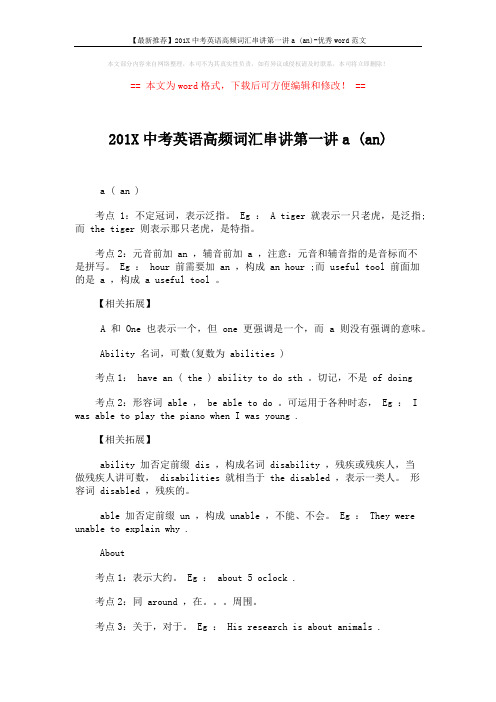
【最新推荐】201X中考英语高频词汇串讲第一讲a (an)-优秀word范文本文部分内容来自网络整理,本司不为其真实性负责,如有异议或侵权请及时联系,本司将立即删除!== 本文为word格式,下载后可方便编辑和修改! ==201X中考英语高频词汇串讲第一讲a (an)a ( an )考点1:不定冠词,表示泛指。
Eg : A tiger 就表示一只老虎,是泛指;而 the tiger 则表示那只老虎,是特指。
考点2:元音前加 an ,辅音前加 a ,注意:元音和辅音指的是音标而不是拼写。
Eg : hour 前需要加 an ,构成 an hour ;而 useful tool 前面加的是 a ,构成 a useful tool 。
【相关拓展】A 和 One 也表示一个,但 one 更强调是一个,而 a 则没有强调的意味。
Ability 名词,可数(复数为 abilities )考点1: have an ( the ) ability to do sth 。
切记,不是 of doing考点2:形容词 able , be able to do 。
可运用于各种时态, Eg : I was able to play the piano when I was young .【相关拓展】ability 加否定前缀 dis ,构成名词 disability ,残疾或残疾人,当做残疾人讲可数, disabilities 就相当于 the disabled ,表示一类人。
形容词 disabled ,残疾的。
able 加否定前缀 un ,构成 unable ,不能、不会。
Eg : They were unable to explain why .About考点1:表示大约。
Eg : about 5 oclock .考点2:同 around ,在。
周围。
考点3:关于,对于。
Eg : His research is about animals .。
中考英语一轮复习S(一)开头词汇(一)讲义
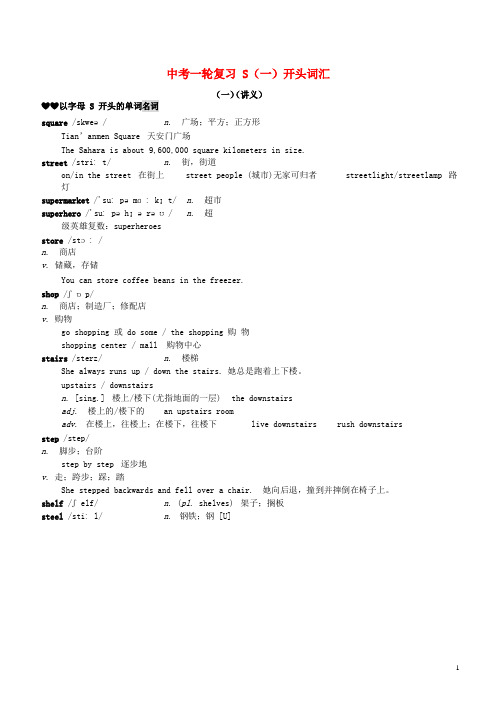
中考一轮复习 S(一)开头词汇(一)(讲义)❤❤以字母 S 开头的单词名词square /skweə/ n. 广场;平方;正方形Tian’anmen Square天安门广场The Sahara is about 9,600,000 square kilometers in size.street /striːt/ n. 街,街道on/in the street 在街上street people (城市)无家可归者streetlight/streetlamp 路灯supermarket /'suːpəmɑːkɪt/ n. 超市superhero /'suːpəhɪərəʊ/ n. 超级英雄复数:superheroesstore /stɔː/n. 商店v. 储藏,存储You can store coffee beans in the freezer.shop /ʃɒp/n. 商店;制造厂;修配店v. 购物go shopping 或 do some / the shopping 购物shopping center / mall 购物中心stairs /sterz/ n. 楼梯She always runs up / down the stairs. 她总是跑着上下楼。
upstairs / downstairsn. [sing.] 楼上/楼下(尤指地面的一层) the downstairsadj. 楼上的/楼下的an upstairs roomadv. 在楼上,往楼上;在楼下,往楼下live downstairs rush downstairsstep /step/n. 脚步;台阶step by step 逐步地v. 走;跨步;踩;踏She stepped backwards and fell over a chair. 她向后退,撞到并摔倒在椅子上。
shelf /ʃelf/ n. (pl. shelves)架子;搁板steel /stiːl/ n.钢铁;钢 [U]sort /sɔːt/v. 把……分类,拣选n. 种类;类别all sorts of…= all kinds of…各种各样的sort of 有几分,有点 (= kind of)I feel sort of sick. 我觉的有点儿恶心。
初中辞汇分词性串讲整理版

八
十
12
7-12
八年级下册副词
一
casually 非正式的;随意的 p.6
三
around 大约 p.20
四
ever 曾经;永远 p.26
luckily 幸运地 p.26
五
sincerel 真诚地 p.38
1-5 problem 问题 p.42
六
particularly
特别地;尤其;异乎寻常的 p.48
whole 整个的;全部的;完整的 p.30 opposite 对立的;相反的 p.35 necessary 必须的;必要的;必需的 p.35 primary 初级的;小学的 p.35
wet 湿;潮湿的 p.51
十
easy 安逸;自在的 p.72
十 二
easy 安逸;自在的 p.72
7-12 八年级下册形容词 一
What's the problem? 怎么了?p.42 quite 相当;十分 p.50
politely 客气的;斯文的 p.58 nearly 几乎 p.66 clearly 清楚地;明显地 p.66
单 动词 元 一 二
enjoy 享受……
三 四
五
六
1-6 describe 描述,形容 七 stop 停顿,终止
remember 牢记,记住 八 九 was,is 的过去式
did,do 的过去式 p. 53 visit 拜访,访问
Additional material
take 乘,坐,搭〔车,船〕
say,说,讲 I’d=I would had,have 的过ቤተ መጻሕፍቲ ባይዱ式 saw,see 的过去式 sit 坐,使坐下
- 1、下载文档前请自行甄别文档内容的完整性,平台不提供额外的编辑、内容补充、找答案等附加服务。
- 2、"仅部分预览"的文档,不可在线预览部分如存在完整性等问题,可反馈申请退款(可完整预览的文档不适用该条件!)。
- 3、如文档侵犯您的权益,请联系客服反馈,我们会尽快为您处理(人工客服工作时间:9:00-18:30)。
Welcome to English Class!
初中英语——词汇串讲
1. 词汇串讲第一组——名词 2. 词汇串讲第二组——数词 3. 词汇串讲第三组——动词 4. 反馈测试 5. 课程总结
词ቤተ መጻሕፍቲ ባይዱ串讲——名词——职业/身份
singer reporter waiter nurse artist
这节课你学习到了什么?
twelve twenty seventy-six two hundred and seventy-eight three thousand and five three hundred and two thousand (and)five hundred and seven thirteen million and two thousand and one hundred and six eight hundred and sixty-six million and four hundred and fifty-three thousand and three hundred and one
记忆口诀: 基数词,不难记,找出规律很容易
一至十二形各异,一个一个单独记 后加-teen为“十几”,thirteen, fifteen看仔细 eighteen 也要提一提,它后只有一个t 表示“几十”要加-ty, twenty, thirty是特例 forty,fifty 更厉害,和eighty一起搞例外 表示数字“几十几”,连字符号要切记 要表“几百几”,and 常把百、十系
睡觉
watch TV swim/go swimming go on the Internet play mobile games draw a picture take/have a walk go shopping get up do exercise brush teeth take a shower have breakfast/lunch/dinner sleep/go to the bed
医生 (男)演员
-ist artist scientist
艺术家 科学家
-man fireman postman
救火员 邮政员
猜一猜这些词是什么意思? buyer、cartoonist、gardener
12 20 76 278 3005 302,507
13,002,106 866,453,301
词汇串讲——数词——基数词
1000以上多位数的读法,从后向前数,每三位数加一个","隔断数; 第一个","号前为thousand(千),第二个","号前为million(百 万)……,第三个","号前为billion(十亿)
¥6,104,584.80
词汇串讲——动词(短语)
词汇串讲——动词(短语)
看电视 游泳 上网 玩手机游戏 画画儿 散步 购物 起床 锻炼 刷牙 洗澡 吃饭
反馈测试
50个消防员____________________ 18个动漫师________________ ¥803,793,400__________________ 散步_____________________ 玩手机游戏__________________ 购物__________________
-er teacher waiter engineer office worker volunteer reporter manager shopkeeper player singer
教师 (男)服务员 工程师 办公室工作人员 志愿者 记者 经理,管理者 店主,售货员 运动员 歌手
-or doctor actor
